Becky Clark's Blog, page 11
September 10, 2020
Good Jobs for Amateur Sleuths
When I pitched a new cozy series to my agent, I had to make some decisions about my main character’s occupation.
In BANANA BAMBOOZLE and MARSHMALLOW MAYHEM, Cassidy Dunne and Dan Diehl owned a newspaper. (I call these the Dunne Diehl Mysteries and it never fails to make me laugh. I am truly my best audience.)
In my Mystery Writer’s Mysteries, Charlemagne Russo is a mid-list mystery author with all the hilarity and angst that entails. FICTION CAN BE MURDER finds her agent murdered, and in FOUL PLAY ON WORDS Charlee goes to speak at a conference and learns a friend’s daughter is missing.
And in the one I was pitching, I decided that Quinn Carr created crossword puzzles and works in a diner. In PUZZLING INK, one of her customers is found face down in a plate of biscuits and gravy when she’s ready to close up for the night.
I thought you might be interested in some of my discarded ideas for my character’s job.
Air conditioner repair — people would be so agonizingly hot and uncomfortable they’d confess to anythingFlooring installer — they’ve always got those kneepads handy for searching for clues in awkward placesAcupuncturist — needles, so many terrifying needlesParking lot attendant — plenty of time for cogitation and analysisCEO of a Fortune 500 company — interns could do all the investigative work, freeing up the sleuth for several romantic subplotsCartographer — ability to locate anything in the worldReality TV camera operator — apparently, at some point they become invisible and people really let their hair (and guard) downGastroenterologist — who better to determine if someone is full of crap?Hydrologist — could probably always get out of hot waterMake-up artist — an expert in all things made upRadiologist — could see right through people
Feel free to use any—or all—of them in your next book. You’re welcome!
Any other good jobs for amateur sleuths?
September 3, 2020
The Fixer Upper
I don’t remember what prompted me to write this story, but I stumbled on it recently.
It’s a little bit different than what I usually write, so I was pleasantly surprised after reading it.
Pam’s house was a two-story fixer-upper from the 1960s that hadn’t been fixered-up, and probably never would. It was left in my care while she backpacked across Scotland.
Despite her pages and pages of intricate and cryptic instructions — Flip the breaker if you want to run the microwave and the toaster at the same time; When the plumbing farts upstairs, threaten the downstairs toilet with the plunger; Open the kitchen window at 2:40 every other day; Do not, for the love of all that is holy, do NOT water the tree out front. — all I really managed most days was picking up her mail, making sure the refrigerator and liquor cabinet was adjusting to my constant presence, and screwing up her Netflix algorithms by watching my shows. Saturday mornings, I also performed triage on her most tragic houseplants. Some Saturday mornings. Okay, once. But in my defense, I never claimed to be nurturing.
Today unspooled in exactly the same manner as all the rest of my days here. I sprawled on the couch, open bag of chips tucked in next to me, almost-empty baking sheet of now-cold taquitos and chicken fingers on the ratty carpet below me, third bottle of beer on the coffee table in front of me, my hand curled around the Netflix remote.
The sun had set long ago, and I vowed to turn on some lights, in accordance with Rules Number 7 (subsections a – c) and 7A (subsection b) — Turn on the interior lights; living room; bedroom; making sure to rotate locations per random order (See Rules 19-26) and Turn on the exterior lights; particularly spotlight in side yard to keep the burrowing animals to a minimum — just as soon as I got up. But I was only on episode five of my current binge-worthy series, so it might be awhile.
I doubted Rule Number 7 mattered much, anyway. If somebody was desperate enough to break into this dump, having lights shining probably wasn’t going to deter them. And if the basement was any indication, could be the animals were tunneling to get out.
I startled awake. Netflix silently judged me, pulsing the question, “are you still watching?”
What woke me if not the TV? I shifted my weight against the bag of chips, creating a tooth-jolting noise in the utter silence, second only to the screech of fingernails on a chalkboard. I plucked the bag from the couch and dropped it to the baking sheet. A trail of chips and crumbs skittered out.
I didn’t move, listening. There was something very weird about being in someone else’s house late at night. You knew all the little sounds of your own place — the creaks and bangs of the furnace, the exact location of each floor squeak, the sudden rattle of the icemaker. Other people’s houses though, especially fixer-uppers, were enigmas. Loud, creepy enigmas.
My feet swung from the couch and planted themselves on the threadbare rug, clearly more interested in investigating than seemed prudent to the rest of me. Reluctantly, I hauled myself up the rest of the way. Three steps later, paused. A branch against the house? El cheapo ticking clock in one of the upstairs rooms? It sounded like scratching, but that made no sense.
Using the ambient light from the TV, I made my way across the dim room to the torchiere lamp standing in the corner. I twisted the knob, it came off in my hand, and the room blazed with harsh light. Again, I froze, listening.
Definitely scratching.
Oh! The burrowing animals. I giggled at the silliness of my worry and headed for the garage, but not before jamming the knob back on the lamp. Perhaps I’m more nurturing than I thought.
The light switch for the side yard was on the farthest wall of the garage, near the outside door. I flipped on the garage light and made sure the door from the garage to the house was unlocked (because I am a girl who learns her lessons the hard way and hopefully only once). I found myself on tiptoe, sneaking across the garage.
The scratching definitely seemed louder now. Definitely coming from the side yard. Definitely skunk? Raccoon? Opossum?
I silently cursed that I hadn’t checked earlier that the side door was locked. Hell, it wasn’t even closed. If it had been, I could run across the garage, turn the outside light on, and run back inside before some rabid animal rushed me.
Ironically, the idea made me move at half-speed instead of double. I was like one of those lions on the savanna sneaking up on their prey, even though it was prey I decidedly did not want.
As I slowly stretched my fingertips toward the switch, the scratchy, scrabbling sound stopped. I flicked on the light. The side yard lit up like a carnival midway. Something small and covered in dirt vaulted from the hole, rushed away, and crashed into a juniper bush near the street.
Relief and adrenaline energized me. I stepped toward the hole the animal had dug and peered at it. The spotlight so bright it rendered the late night obsolete.
My breath caught and held. Ice coursed through my veins. My internal organs shifted one inch to the right.
The excavation resembled a miniature grave, maybe four feet deep, about three-feet by two. Tiny chaotic footprints muddled the dirt floor and in the scattered dirt above. At the short end of the hole were two perfect child-sized handprints planted in the mounded dirt. Scrawled nearby was a message: Won’t forget.
* * * * *
So, Readers, I went back and forth about the message at the end. Which do you like better … “won’t forget” or “Pam”?
August 27, 2020
When endings aren’t endings
12-6-17
We all have our favorite book or movie endings. Those perfect denouements that surprise you or confirm what you suspected all along or make you weep with emotions you can finally release.
But for me, endings are rarely endings. (Although I’ve yet to read a book where everybody dies and the entire universe explodes. That might be the exception that proves my rule.)
People ask me all the time, “Where do you get your ideas?” My answer is always, “Where DON’T I get ideas?”
Magazine stories about something I never knew to be of interest to me, a snippet of conversation I hear while shopping, a particularly interesting face I see at a restaurant, memories of my own, airport drama I eavesdrop on, stories my friends tell of growing up, a newspaper blurb that leaves me with more questions than answers, a piece of art hanging in a museum, an old photo I stumble on in an antique store, a dream so real I remember all the details, a disjointed turn of phrase from a novel, a what if so compelling it keeps jabbing at me until I pay it some attention.
Ideas are why endings are rarely endings for me. Even if a story is tied up with a neat little bow, I always tack on another chapter in my head. And another. And another. It’s the difference, I think, between a writer and a reader. Or maybe between readers and nonreaders.
In my head, tomorrow is indeed another day for Rhett and Scarlett. In fact, they’ve probably had a month of tomorrows in my brain, all while wearing spectacular clothes.
I know the games Christopher Robin and Pooh will play in the Hundred Acre Wood tomorrow, next week, and next year. And I know that some dopey do-gooder will insist that Eeyore get some anti-depressants and that Tigger needs some Ritalin.
Just because Scout Finch never saw Boo Radley again doesn’t mean I haven’t.
Now as I reread what I’ve written here, I sound a bit wacky. So, please, please tell me that you tack on extra endings to books and movies like I do. Or at least pretend you do so I don’t look so crazy.
July 30, 2020
Get To Know Becky with these FAQs
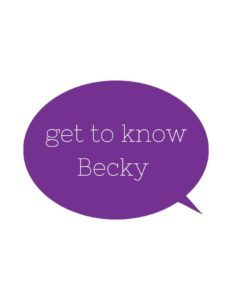
• How did you get started writing?
A million years ago, when my three kids were young, I quit my corporate job to stay home with them. While my new job came with many perks, a paycheck was not one of them. So I started a home daycare and took in other children. It was fantastically fun and chaotically challenging, but it wasn’t always, how you say, mentally stimulating. So at naptime, I went upstairs to my office and wrote funny, slice-of-life essays à la Erma Bombeck. It was perfect because I could write one in an hour or so, before anyone missed me. On a whim, I sent one off to a magazine and immediately forgot about it (because my brain had turned to mush, remember?). Until the day I got a check in the mail. That was the sweetest $50 I ever made. It was so much more than money. It was validation. Somebody understood and appreciated what I was doing. They thought I was funny and had something to say. Very heady stuff for someone with a mushy brain.
Fast forward seven years or so, when my middle child was around ten. He and I were at the library looking for historical fiction books he hadn’t read. Alas, there were none. As we walked back to the car, he put his widdle hand in mine and said, “Why don’t you just write one, Mom?” I looked down at his earnest, hopeful face … and laughed. “You cray-cray, boy!” I said. (No, I didn’t. I was a good mom.) But it did seem far-fetched, simply a child’s fantasy. But it nagged at me and I thought about it all the way home. Seven minutes later (we live in a very small town), I was sitting in front of the TV watching the Broncos play football. On my lap rested a yellow legal pad where I listed all the periods of history I was interested in. I settled on the Civil War, partly because it interested me, but also because I knew kids in our school district studied it in 4th grade and again in 7th grade. I knew there’d be a market. But could I actually write an entire novel?
Turns out I could! I decided to self-publish it because that interested me, too. The only problem was that 5,000 copies were delivered to me a couple of weeks before 9/11. Remember all those unopened envelopes tossed into dumpsters because everyone was afraid of anthrax? Yeah. A lot of those envelopes would have included my book because my marketing plan was to send out a bunch of review copies. So I had to totally rethink how I was going to sell this book. I tell people self-publishing this book was like getting a PhD in publishing with a Roman candle stuck up me bum.
Long story not much shorter, I spoke to whoever would listen to me and basically hand sold all those books over the course of a few years. I have two boxes left in my basement. Collector’s items, they are.
But the experience lit a fire under me. I could write a novel and talk people into buying it! It was truly a revelation. So I wrote some more for kids, younger and older, but then it got to be more difficult to go into the schools. The money for author visits dried up, the gatekeepers became more persnickety, and I developed this condition … what was it called … oh yeah, “potty mouth.” School visits were not a good option any longer.
So I transitioned to writing for adults where I’m as happy as a cactus in sunshine.
• Where do you get the inspiration for your stories?
I’m drawn to stories where people—who are exactly like you and me—are just going on about their lives, then BLAMMO, they get tossed into some kind of chaos. How do they react? What do they do? They’re the ultimate reluctant heroes and want nothing more than to return to their previous, boring lives. I like the idea of “what ifs” in real life as well as fiction. When I come upon a car accident, I can’t help but think, “What if I hadn’t taken that call before I left home … would I have been the one in the accident?” Or, “What if I hadn’t turned that corner/quit that job/met that person/taken that chance? My life would be totally different.” But I doubt it would be any better!
• Do you know how your novels will end before you start writing, or do you make many changes along the way?
Yes, I know how they’ll end, and yes, I make a ton of changes along the way. I start at the end and know how the crime happened, whodunnit and why, and then I work my way backwards, forwards, and sideways to get at the rest of the plot.
I outline my stories and don’t start writing until I have a timeline and a 30ish-page synopsis that I follow. My brain works in a very linear manner. I find it almost impossible to pull a story thread and not watch in horror while the whole thing completely unravels at my feet. It sends me into bed, or a bottle, or an entire cheesecake —whichever is handiest— so I’d rather not have that angst.
With my outline, I know where I need to drop clues and pick them up again. I know which characters are liars and which ones are honest but dumb. I know the twists I want and where to place them. But I also allow the story to take interesting turns when they come up.
I equate it to driving from Los Angeles to New York. I know when I’m leaving and when I need to get to my destination. I know the route I’ll be taking. But if I see a billboard for the world’s largest ball of twine, or Carhenge (google it!), or free ice cream cones, you can bet I’m taking that detour. And even if I know I’m on Route 66 going through Tulsa at lunchtime, I don’t know where I’ll be eating until I get there and prowl around a bit.
So there are surprises along the way for me as I write, even though I have a fairly vigorous outline.
• How do you come up with characters and give them personalities? Do you think of someone in your everyday life and use them, or invent them completely?
Because of my outline, I know in broad strokes who I need to populate my little literary world, but they start out with placeholder names like elderly neighbor or bad guy or buttinsky co-worker. Sometimes I know exactly who they are before I begin, but for others, at some point in my outlining I’m able to get a handle on them, at which time I dig up a photo of a celebrity or friend. If the character reminds me of Meryl Streep in Sophie’s Choice, or Tom Hanks in Big, or Sean Bean, in well, anything, I print out that photo. (Aw, who am I kidding? I don’t need a reason to print out a photo of Sean Bean.) I also have a computer file of random headshots of interesting looking faces.
Then I drill down to more specific characteristics and pretty soon, the only way that character is like Meryl Streep is because of her accent or her hair or her nose. She’s unrecognizable.
Of course, for recurring series characters I need to have a pretty good grip on the character before I start on the outline. Plus, I have to remember what changed for them in previous books so I don’t do something stupid like marry them off in book three and then have them scrolling through Match.com in book four. A married sleuth will have a different take on investigating, perhaps being more careful or enlisting help more often, so those changes will inform character.
Specifically, I came up with Charlemagne Russo in my Mystery Writer’s Mysteries as I was reading a book one day involving some kickass heroine and wondered, “What would I do if I was in that situation?” And I realized I wouldn’t do any of what that character was doing. I’m too big a chicken! I thought that would make for an interesting character to put in situations.
• How much research do you do and how many details must you research?
Writing cozy mysteries means I don’t have to do a lot of police procedural or forensics research, but I get to follow all kinds of interesting rabbit holes.
There’s always something that needs to be researched, like Charlee’s car in FICTION CAN BE MURDER. When I was trying to decide what she’d drive, I stumbled on something that said a particular car had enormous cupholders. Knowing how much Charlee likes her coffee, she’d appreciate that. Also knowing how Charlee spills on herself, I knew at some point that coffee would come flying out of there.
In my new Crossword Puzzle Mysteries, I started to teach myself how to construct crosswords, which is way harder than I expected. In addition, I researched Obsessive-Compulsive Disorder, depression, diner lingo, poisonous mushrooms, and green card marriages, among other things.
It’s really easy to over-research so I try to do my outline or basic character studies first and then only dive into what I really need to know, as opposed to what I really want to know. I learned this with my very first book, the historical fiction for kids I published way back in 2001. I stumbled on some first person accounts of the war, diaries from soldiers on both sides. I was stunned because I had the misconception that these soldiers would have been illiterate. The writing was absolutely riveting, with gorgeous, lilting language and I spent way too much time with them. It was marvelous to read, but I didn’t need all that for the book.
When I dig into the research for something, I start with a basic internet search, maybe Wikipedia or the Mayo Clinic or a police department website. Sometimes that’s all I need. But other times, I read a bunch of books on the subject, often beginning in the children’s section at the library because those books are short and sweet, and spell issues out in simple ways. If that’s not enough, I try to find people who will answer my emailed questions, or meet me in person or talk to me on the phone. That’s kinda scary, but you’d be surprised how many doors get opened to you when you say, “I’m writing a mystery and I have a couple of questions. Would you be willing to talk to me?” It also helps that I have a nephew who is a cop in a big city, a son who is a military cop, and another son working as a paramedic. I text them all weird, out-of-the-blue questions with no introductory paragraph, just “So … I have someone tied up in the basement and …” or “Would it hurt to get a staple in the face?” or “I just stole your weapon and …” They answer without even questioning whether I’m a criminal or not. Oooh … that could be an interesting twist in a novel!
• How do you decide whether to use a real location or a fictionalized one?
I’ll probably never use a wholly real location, because there are too many details to get wrong. And even if I get them exactly right, something may change post-publication. Say I use a real hotel in a story and describe the lobby perfectly. But three years after I publish the book, the hotel does a major remodel, knocking down walls, replacing their red swirly carpet, and moving the lobby bar to the second floor. I’d get so many letters and reviews complaining about how wrong I got it, with purists vowing never to read anything of mine ever again. “One-star for you, lady!”
I’d prefer to get a real hotel in mind, preferably one I’ve spent some time in, rename it, then describe it however I want. And if I need an extra door on the other side, then poof — I get another door.
I also wouldn’t want anything bad or unseemly to happen at a real location, so I think it’s better to fictionalize everything. It’s like that photo of Meryl Streep … it may have started out being a Marriott or an IHOP in my brain, but on the page it morphs into something completely different.
• How do you know if your book is long enough? Do you ever add an event in the storyline just to make it longer?
My contracts with publishing houses generally specify the length of the books. My genre of cozy mysteries does, too. Cozy readers tend to like books in the 65,000-75,000-word range (about 260-300 pages), and that seems to be my writing sweet spot as well. When I finish my first draft it’s probably 20,000 words short, not because I don’t have enough stuff happening, but because I tend to write fairly spare, without a lot of description or narrative. So I’m not really adding events as much as I am fleshing out the story that’s already there.
I will tell you that one time I was outlining a book and realized what I thought was a full novel just turned out to be the first half of it. Luckily I recognized it during the outlining stage rather than while I was writing. Wouldn’t that be a hoot to get to what you think is THE END when it’s really just a twist in the middle? And by “a hoot,” I mean excruciatingly painful and heart-breaking!
• What do you know about your characters that you keep hidden from readers?
Almost everything. Picture an iceberg sticking up out of the water. That tiny bit you can see above the waves is what the reader knows. But there’s a huge mass underwater that only I know. Childhoods, secrets, innermost thoughts and desires, even lies they tell themselves … I know it all. Some may come out in future books, but most won’t. Think of yourself and how much you keep hidden. Not necessarily because you have terrible secrets, but because there’s so much that makes up your life, personality, and experiences. You couldn’t possibly share all of that with anyone. My husband and I have been married since 1984 and he can still surprise me. You’d think we’d know everything about each other by now, but you’d be wrong! It’s the same for fictional characters.
• Do you do vision or Pinterest boards for your books?
I don’t do anything like that. The closest I come to visual representations of my novels are my character photo pages, and maps or diagrams I sketch of my settings, all of which is for my personal use while I write. I’m also very, very afraid of Pinterest because whenever I go on there, I look up and I’ve lost an entire morning! I think it’s a diabolical wormhole of some kind.
• What is your writing process like?
Like I said, I outline fairly rigorously, starting with a character, or an intriguing opening, or the crime … whatever information I have first. Then I work my way back and forth through all the beats that will make up the story: twists, clues, red herrings, the catalyst, etc. When my outline is done, it’s maybe five pages. Then, I write a synopsis in paragraph form from the outline, adding some more details, putting in real names instead of placeholder names like Bad Guy, or nosy neighbor, writing funny dialogue that occurs to me. This ends up being 30+ pages. From the synopsis I know what I need to research, so I do that. Next I do a specific timeline so I know 1) that everything I say that will happen in a day actually can happen in 24 hours and 2) it gives me a visual representation of each day so I remember that if it’s Sunday, my character probably doesn’t have to go to work or if it’s Wednesday at 10am, maybe she should be at work. It seems obvious, but it’s really easy to lose track of that kind of stuff.
Then I write my first draft, using the synopsis and the timeline.
I write at a standup desk on a mini-trampoline, taking Wednesdays and weekends off, focusing for an hour at a time. I set a timer and when it dings, I stop, even if it’s mid-sentence. I jot down how many words I wrote, and then take a 10-minute break. I eat something, or tinkle, or pop up Becky’s Dance Party playlist and get some cardio in … or all three! Then I’m back at it for another hour, maybe two. I don’t really like writing for more than three hours, because my productivity really goes down. But sometimes I do it anyway. It’s physically demanding, as well, so four hours can be rough. Plus, it seems like I’m a bit brain dead afterward so I struggle with the rest of what I need to get done that day. Two or three hours per day is my sweet spot.
At the end of my writing day, I email my manuscript to both of my email addresses (why, yes, yes I did have a computer crash once. How did you know?), and I print out that day’s work for my binder. And, no, I don’t look at the pages.
After I get all done with my first draft, I start in on the pages in my binder, but not before I have a celebratory adult libation! Even though I outline, by the time I write THE END, my story will have changed enough that it needs a pretty thorough going over. Plus, I have to address all the sticky notes plastered on it. “If such-and-such happens in chapter 15, I need to say something about it in chapter 4” … that kind of stuff. I add description and narrative that is missing or inadequate in the first draft. When I’m satisfied, I send it off to my trusted beta readers and my agent. I have a posse of readers, all with different strengths. Some are good at finding my logic bombs, some fix my tense and point-of-view shifts, some catch every single typo, some make sure it all flows with good pacing. Most do a combination of all that. They are the wind beneath my wings. The chocolate chips in the brownie of my life. The people who keep me from looking like a dope. I heart them with the white-hot intensity of ten thousand suns.
I give them a deadline, they give me their notes, and then I decide if they’re right or not. (Spoiler alert: they almost always are.) I fix it all again, then off it goes in final version to my editor. And I get another celebratory adult libation.
I actually wrote EIGHT WEEKS TO A COMPLETE NOVEL detailing my process if you’re interested in the nitty-gritty.
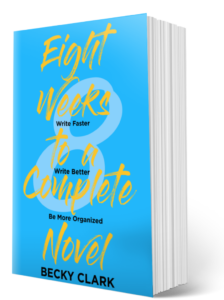
• What’s your idea of a perfect day?
One where the dog doesn’t piddle on the furniture, the phone doesn’t ring, and I magically fulfill all the tasks on my to-do list early enough in the day so that I can create a thrilling dinner for my husband which fricasees (or simmers or bakes or does whatever a thrilling dinner might do) while we open an expensive bottle of wine and carry on a scintillating and wide-ranging conversation that has nothing to do with children, bills, or piddling. Then, while he’s cleaning the kitchen, I have long rambling conversations with my kids and anyone who’s been on my mind lately. Oh, and I’ll walk on an Oregon beach at some point and take in a Broadway show. A girl can dream, can’t she?
• Which books/authors inspired or influenced you the most?
Nancy Drew books turned me into an avid mystery reader and I was crushed—crushed—to learn that Carolyn Keene wasn’t a real person. Now, as an author, I would kill for a gig like that. My, how the worm turns, eh?
In high school, when I read “To Kill a Mockingbird,” I thought Harper Lee did such a masterful job, penning such a lyrical and important book with an amazing voice in Scout, but I couldn’t believe that was all she wrote. It reinforced in me the idea that writers were magical, mystical unicorns and I’d never understand them.
I’ve always read across most genres, but when I discovered Janet Evanovich, Carl Hiaasen, Tim Dorsey, and Jen Lancaster I finally felt like I was in the company of like-minded peeps and that maybe, just maybe, I could do something similar.
• Do you listen to music when you write?
No, I need absolute silence when I write. But I do stop every hour or so and flail around to my “Becky’s Dance Party” playlist, often while I hula hoop. It’s a sight to behold, I’m sure.
• What themes do you regularly visit in your writing?
Themes?? What is this, school?
• Tell us about your main characters.
In both BANANA BAMBOOZLE and MARSHMALLOW MAYHEM, 50-something Cassidy Dunne takes center stage. She’s a secret sugar addict who still has booty calls with her ex-husband even though they were only married for about ten minutes way back when. (It’s just so much easier than dating!) She’s joined in her escapades and witty repartee by her best friend from college, Dan Diehl, hence the “Dunne Diehl Novels.”
In the Mystery Writer’s Mysteries, Charlemagne Russo is a 30-something mid-list mystery writer who really only wants to write, but she gets pulled into real-life mysteries she has to solve. She has a solid relationship with her boyfriend, hangs out with her best friend from college, and is surrounded by a critique group full of quirky writers. With her, I’m able to give readers a peek behind the literary curtain, and explore and explode some of the funnier aspects of writing and publishing.
Quinn Carr is the protagonist in my Crossword Puzzle Mysteries. She, too, is in her mid-30s and has had to slink home after a pretty serious incident where her OCD was diagnosed. All she wants is to get back to normal and, though she loves her parents, she’s much too old to be living with them. But the OCD, subsequent depression, and lack of money won’t allow it. Her best friend growing up is a cop in their small town police department, who thinks she’d make a great cop, but Quinn doesn’t. She’d rather keep plugging away at constructing her crosswords for the local paper and slinging hash at the diner, inching toward that elusive “normal” she craves. While it sounds a bit deep for a cozy, it’s really not. The town has the requisite number of quirky characters (for instance, The Retireds, a group of old men who gather at the diner every day to complain; Quinn’s mom who experiments with recipes and creates things like Pretzel Pancakes and Cumin Cupcakes; Jethro the bloodhound who patrols his way through the diner every morning; the Chief of Police who hates Quinn for reasons known only to him). I just like exploring normal, funny people who get thrown into situations they’d rather not be in. And everyone—even normal, funny people—have baggage and issues they carry with them. They’re not the most important things about them, but they’re always there under the surface, informing reactions and decisions. And there’s always humor in the darkest of problems. That’s how we survive them.
• Do you have a signature accessory, color, fragrance, phrase/expression, or meal?
Hmm. I have this vertical line on my forehead my three children know as my “what the hell were you thinking” wrinkle. Does that count?
• What do you do for fun?
I make purses out of rescued books.
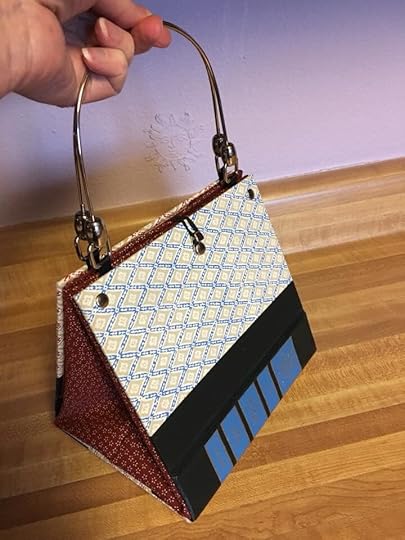
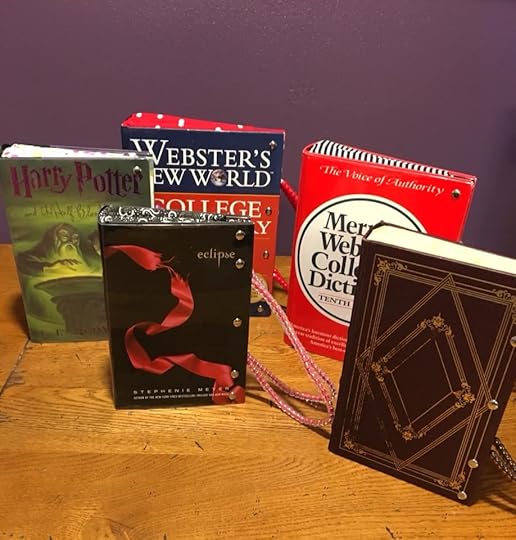
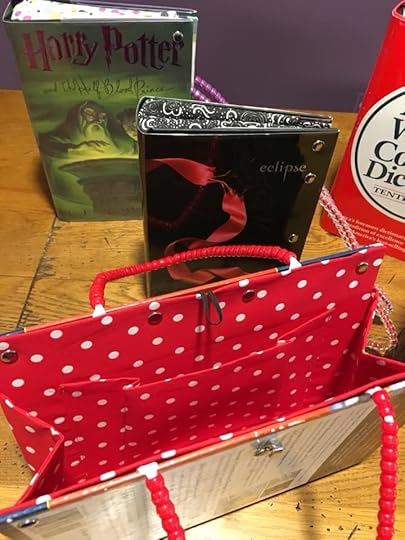
I can make one, start to finish, in about five hours (assuming my workshop is clean). Books take so long to write and get out the door, but these purses scratch my creative itch very quickly. I tried selling them on Etsy, but that requires marketing and work that I wasn’t interested in doing. The store is still up, but not very active. You can see some of the other purses there. I’ve sold quite a few, but now tend to give them away to people on my mailing list and in my Facebook group, Becky’s Book Buddies.
My husband and I love the big, splashy Broadway shows and we’re lucky most of them come through Denver at some point. We have season tickets to the theatre and look forward to every show in our subscription.
I also loves me my Netflix. We’ve never had cable TV so I get to catch up and binge on shows I’ve heard about over the years. I think I’d rather binge them anyway, because I’m not patient enough to wait a week for the next episode, nor can I remember important plot points that long, if I’m being honest. Netflix has everything I love … foreign movies, stand-up comedy, indie flicks, old favorites, original programming. And unlike going to a cinema, I can press pause while I get a snack!
• What do you typically read?
I read across the entire crime fiction spectrum—true crime, thrillers, procedurals, British traditionals, locked room mysteries … you name it—but I’m drawn to traditional mysteries with humor and cozy mysteries, which are typically lighter reads with a fair amount of humor, off-stage murder and sex, and generally a cast of fun, quirky characters.
• How are you so funny?
LOL! I come from a big, funny family—I’m 7th of 8 kids raised by hilarious parents—so the stage was set early on. Then I married a funny guy and we raised funny kids. I don’t take myself (or anyone else) very seriously and I can find the humor (often dark) in most everything. I watch a lot of stand-up comedy which has about a zillion different points of view, all of which feed my mental in-box. And, of course, having kids and dogs in your life is always hilarious.
• Speaking of hilarious, do you have any pictures of Nala?
Pictures of Nala, hmm … let me think. *mentally scrolls through tens of thousands of pictures of Nala* Yes, I think I can dig up one or two.
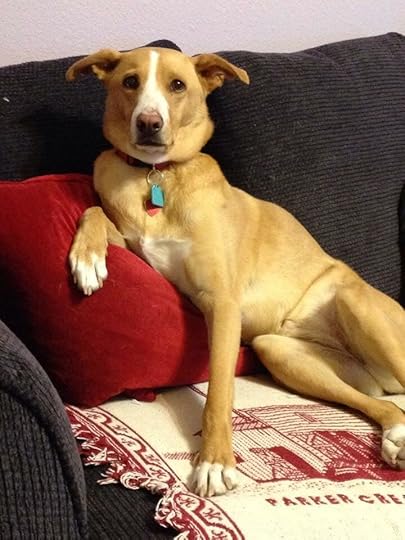
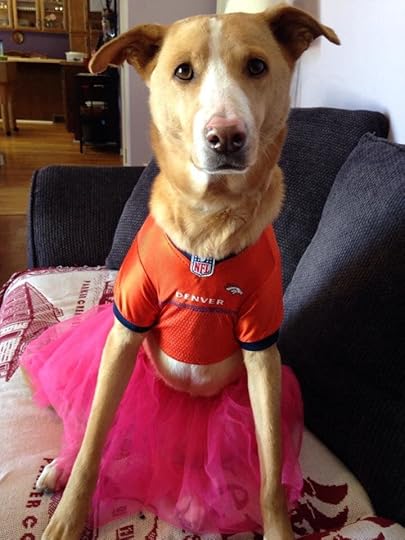
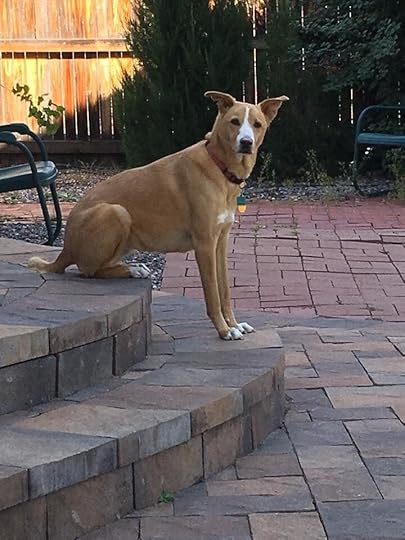
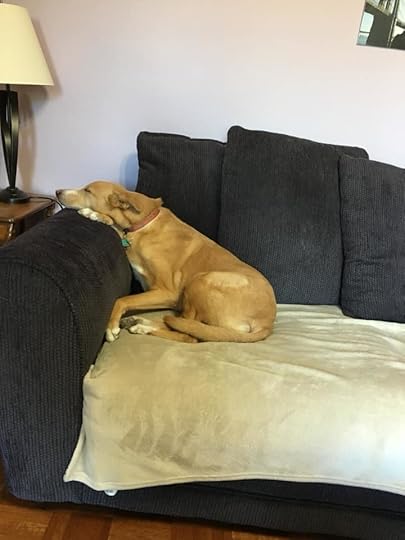
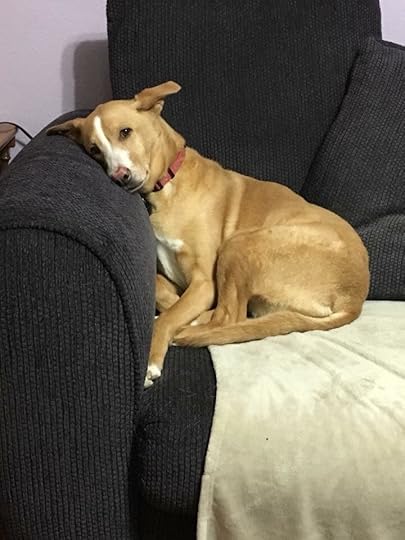
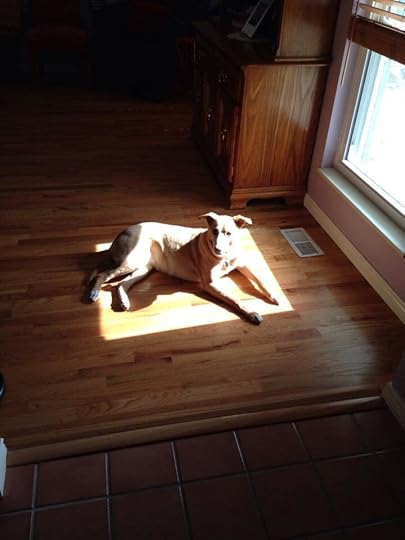
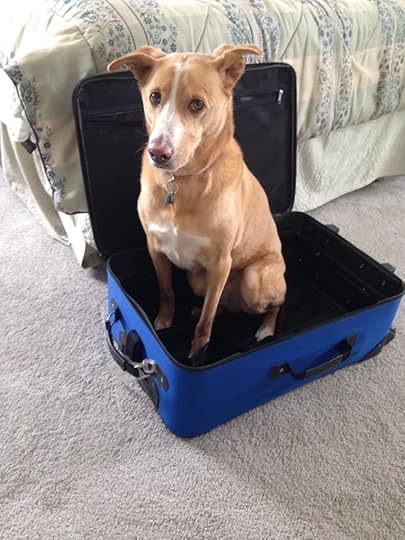
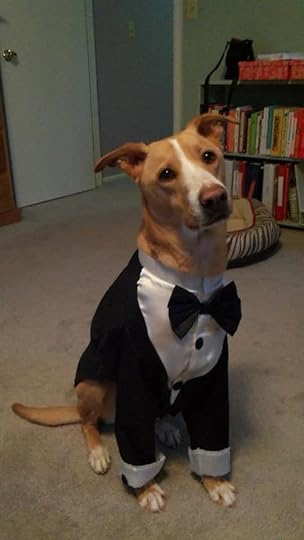
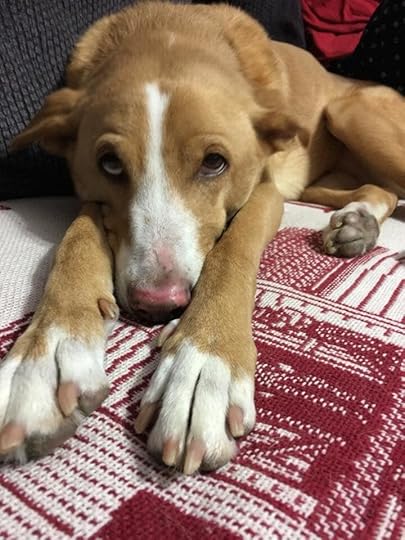
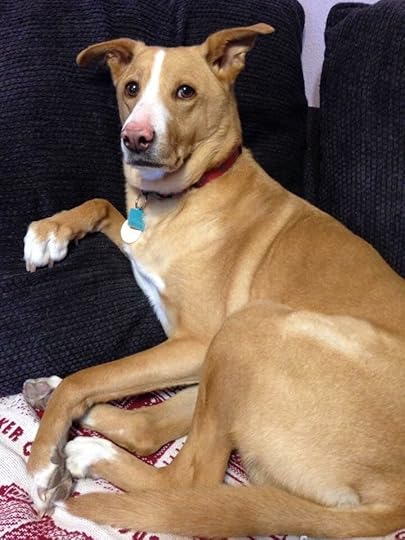
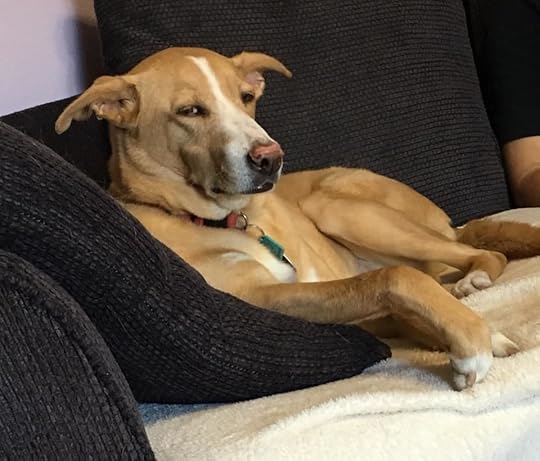
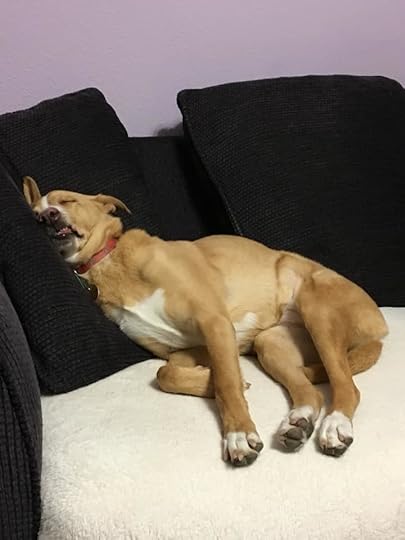
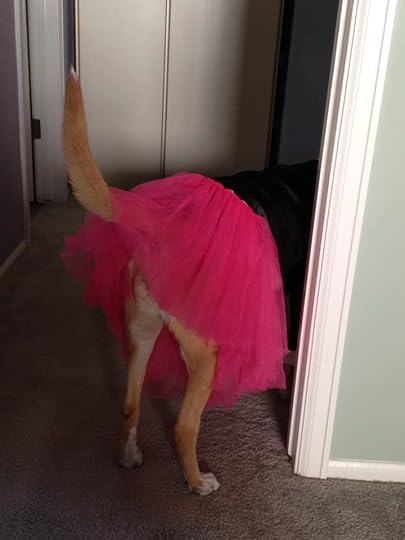
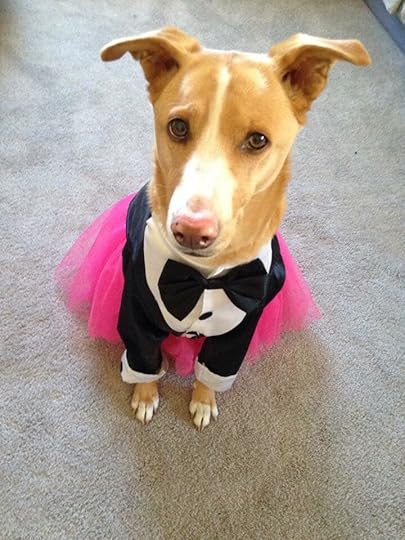
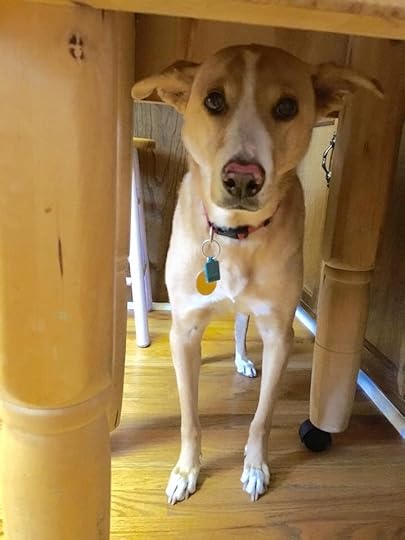
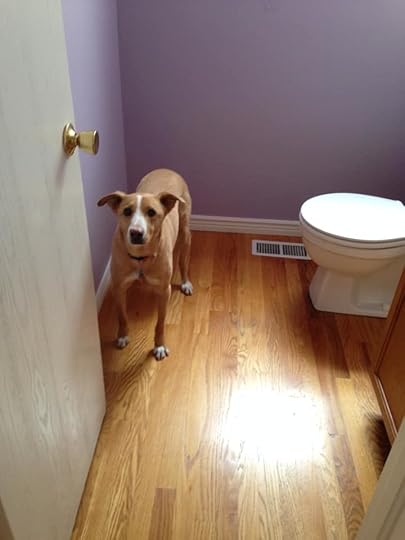
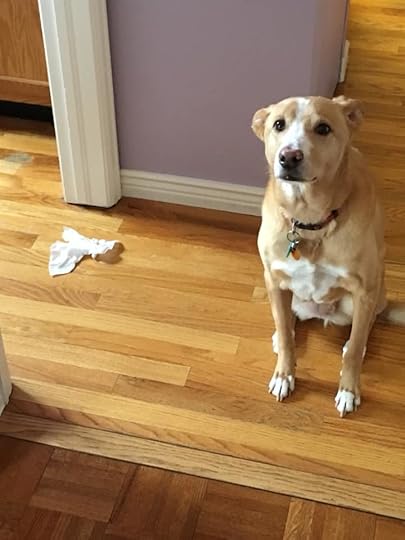
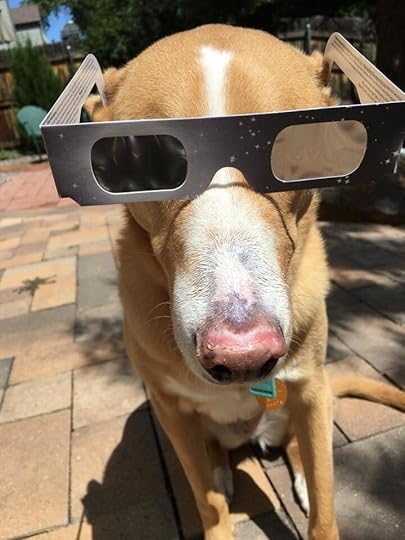
• What’s next for you?
I have so many things I want to write! I want to keep writing books in all the series I’ve started. I have a bunch of standalones I’m mulling over. I have some funny middle grade time travel things I’ve already written that I’d like to get back to. I have a couple of YA mystery manuscripts in my drawer with a synesthetic member of the high school marching band. I’m noodling another cozy series with a huge cast of characters, which would keep me busy for two lifetimes. I have notes on a cozy series with an elderly cast. And I have an “Ideas” file about three inches thick with stuff I want to write. I hope I live to be 847 so I can get it all done!
If you want to know my most horrifying research excursion, see a photo of the ridiculous place I work, and get the low-down about my writing nemesis, you’ll have to subscribe to my So Seldom It’s Shameful newsletter.
Protected: Charlee and Viv’s Book Tour bonus story
This content is password protected. To view it please enter your password below:
Password:
July 21, 2020
Here’s the 1st Chapter of FOUL PLAY ON WORDS
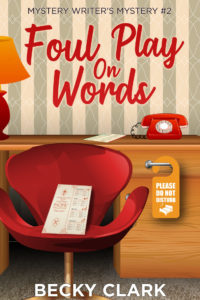
ONE
Waiting for someone to pick you up at the airport is like being forced to be eight years old again. Waiting at the curb for the school bus. Waiting in the corridor shoulder-to-shoulder with your line buddy until everyone in class has puffed out their cheeks, holding invisible “Quiet Bubbles” in their mouths until it’s acceptably hush-hush-hallway enough to march out to recess. Waiting for your mom to rescue you much too late from a disastrous birthday party, like when she forces you to go to Tommy Ryan’s, that annoying hair-puller. She promised I’d have fun once I got there.
Why do parents lie like that? Did she really need two hours’ peace that desperately? If she’d only leveled with me that she needed a break from my incessant chatter, I’d have gladly sat quietly in a dim room mentally thinking up rhymes for my teacher, Mrs. McRucker’s, name. That always amused my eight-year-old self.
My thirty-year-old self wasn’t as easily appeased.
Again, I edged out from under the shelter of the overhang to peer down the roadway, hurrying back when rain began dripping off the tip of my nose.
“Where is she?” I spoke to myself, even though several people also waited nearby. Perhaps like me they were waiting for someone—parent, spouse, pal, clown car—to swoop in and pick them up at the Portland airport. Behind me, the terminal. In front of me, past the large concrete overhang, soft Oregon rain. To my left, bored or anxious or annoyed passengers, resigned or worried or irritated that their designated rides hadn’t shown up yet. To my right, the MAX light-rail train loading passengers for the trip to the Portland city center or other travel hubs. I’d already watched seven trains on the two tracks come and go. But still no Viv.
Despite my exasperation at having to wait for her, I couldn’t help but smile when I thought about hanging out with her again. I hadn’t seen Viv in a few years, but we’d had some glorious adventures in the past. Sharing hotel rooms at writers’ conferences like two teenagers at a slumber party, sitting on panels, teaching workshops together, and going on that book tour. Oy, that book tour. Our first books were published within three weeks of each other, so we’d organized a tour together through eight states stretching from my home in Colorado to hers in Oregon, hitting every major city as well as many podunk towns in between.
Our publisher didn’t foot the bill for our book tour. Viv and I paid for everything out of our minuscule advances, so after every signing event, she talked our way into free meals, drinks, or hotel rooms along our route. After a while, I couldn’t remember what was the truth about us and what was the fictional embellishment she wrapped us in. Regardless, we seemed like the two most interesting women in the world. So what if it wasn’t completely accurate? At least it was entertaining, especially for us.
If I felt uncomfortable when she got too outlandish, Viv convinced me that it was what people came to hear. We were obligated to give them their money’s worth. When I reminded her we spoke for free, she said, “If they only met boring old us, they’d be disappointed. At least now they have awesome stories to tell at parties about the time they got to hang out with those two crazy writers.”
I laughed out loud. Did anyone actually remember any of her tall tales?
A man standing nearby smiled at me, then spoke with a British accent. “I shall go barmy if I have to wait much longer, but it seems you bloody well don’t mind waiting to be picked up.” He gestured toward the terminal. “I heard a bloke inside say there was a tie-up on the motorway.”
“Actually, I’m thinking about turning around and flying right back to Denver. Or at least going back in for a grilled cheese sandwich. With bacon.” I eyed the terminal doors behind us.
“Don’t like Portland?”
“I love Portland. But I’m here to speak at a writers’ conference, and I’m nervous. I’ve been on panels before, and taught workshops, but my friend Viv, who’s the organizer, wants me to give the keynote speech at the banquet on Saturday.”
“Are you an author?”
I nodded and thrust out my hand. “Charlemagne Russo. Charlee. I write mysteries. But I’ll bet you’ve never heard of me.”
He shook my hand and quirked his mouth apologetically. “Sorry. I don’t read mysteries. I’m Sir Richard Headley.”
“Ooh, I’m in the presence of royalty.” I gave a demure little bend of the knee, making him laugh.
“Nah, not really. Just pretending. Call me Ricky.” The posh British accent was gone, replaced by a flat Midwestern one. “I’m from Nebraska. Practicing my accents. I was in the Russian Politburo on the way here.”
I raised my eyebrows at him, hoping there was more explanation coming.
“I travel a lot—I’m a motivational speaker—and believe you me, every single person on this planet pretends to be something they’re not and feels like a fraud. And some of them actually are.”
“Like me.”
“I’m sure you’re not.”
“Are you here to … motivationally speak?”
He shook his head. “Friend’s wedding. Haven’t seen him in years. Not really sure why I agreed. The things we do for friends.”
“Indeed. I’m even using my own hotel points and I flew in early because flights on Wednesday were cheaper.” I peered hopefully at the cars coming down the passenger pick-up lane, but they all stopped for other travelers. “I should have called a cab or taken the MAX, though.”
“Same here. I’m supposed to be taken for a tuxedo fitting, but I don’t know where. Otherwise I’d be in a cab.” Ricky glanced at his phone, then dropped it back in his pocket. “So, tell me. What does one do at a writers’ conference? Surely you don’t sit around and write.”
“Well, sometimes, depending on the workshop you’re in. It’s a group of writers, I think about three hundred this weekend. All different skill levels and all genres, although some conferences focus on just mystery or romance or sci-fi or whatever. It starts Friday afternoon with pitch appointments—”
“Pitch appointments?”
“Writers who are looking for literary agents or publishers can get short meetings with them to see if there’s interest in whatever story they’re working on. The agents ask for a few chapters or the whole manuscript, and then the writer can spend the rest of the conference giddy with relief. Or they might get the brush-off and decide never to write another word as long as they live. Never, ever, ever.”
Ricky smiled and showed his dimples. “You seem to have some experience with that.”
“Yep. If you’ve never wanted to quit writing, you’ve probably never shown your work to anyone.”
“Is that all that happens over the weekend? People either get manic or depressed?”
“Nope. That’s just the fun part.” I smiled, hoping to get him to show those dimples again, and was rewarded. “There are also critiques of pages you submit—”
“More heartbreak—”
“Lots more. But there are also workshops about all kinds of writing-related topics, and you get to meet other writers, some of whom are famous—”
“Like you.”
“No. Famous ones. I’m midlist. Nobody knows me.”
“I think you’re selling yourself short. You were asked to give a keynote speech at the banquet of a weekend conference. I’ve never been to one of these things, but I suspect that’s where they put the most famous of their faculty.”
I wrinkled my nose. “I told you, the organizer of this conference is a friend of mine. She couldn’t get anyone else.”
Ricky sighed at me like my father would have. “Tell me about your speech.”
I made a noise in my throat. “It’s called Seven Things I Know About Writing.”
“And they are …?”
My mind blanked. I squinched my eyes but that didn’t help, so I pulled the notes out of my messenger bag. I flipped and shuffled pages, all strike-throughs and scribbles, trying to identify any of the seven things.
Ricky held out his hand. “Can I see?”
I offered the pages. They shook gently as I held them out, which surprised me a little. My tremor hadn’t bothered me very much in the few weeks since I’d found out what really happened to my dad. I’d had the tremor for years, since his funeral, but maybe I could soon be free of it.
“You may need to Lysol your eyeballs after you read this,” I said.
He was holding the opposite end of the pages. “I’ll take my chances.”
I finally let go, and he pursed his lips while he skimmed the pages. “This is good.” He pulled a pen from his shirt pocket. He cocked his head at me. “May I?”
I had no idea what he wanted to do, but he certainly couldn’t hurt that mess any worse than I already had.
He went back to the first page and circled single words. Then he turned to the blank back of the last page, flipping back and forth through the text as he wrote a list. When he finished, he stepped closer to me and pointed at the list with his pen. “These are the keywords for your seven main points. Now I just need to—”
I reached for the pages, but he held up one hand. He rewrote the list of seven words in a different order, then announced, “Achieve.”
“Well, I’ll do my best, but—”
“No. ACHIEVE is the acronym you need to memorize, and your whole speech will fall into place.”
He saw my confusion and pointed at each letter of the acronym and each of the keywords he’d written. “ACHIEVE. A for ability, to craft a story. C for courage, to put yourself out there. H for hocus-pocus—”
“Sometimes you need magic to make it all work right.”
Ricky nodded. “I for imagination …”
“For your story and for marketing and promotion.”
“E for editor …”
“Writing is rewriting, find an editor you trust.”
“V for voice …”
I thought back to my notes. “Your voice and your character’s voice are what make your writing unique.”
Ricky showed me his dimples again. “And last, E for earnings …”
“The goal of every writer. Professional writers get paid for their writing.” I nodded appreciatively. “You might actually be a genius, Sir Richard.”
“You should write a book about me.” He handed back the pages.
“Absolutely. But I’d have to make you a murderer. Would you settle for a sandwich as payment for dropping your knowledge on me?” I gestured with the pages toward the terminal behind us. “It’s way past my lunchtime. I’m starving.”
“Me too.” Ricky glanced toward the terminal, then down the road. “Maybe he forgot about me. Okay, let’s go get a—”
A horn beeped and an SUV rolled up. A harried guy leaned toward the passenger window. When it had rolled all the way down, he said, “Rick, man, so sorry I’m late. Accident on the freeway.”
“It was lovely to pass the time with you, Charlee, but it appears my chariot has arrived. Can we drop you some place?” Ricky picked up his bag and moved toward the SUV.
“No, my ride’s probably stuck in the same accident. I’ll be fine. Thanks anyway. And thanks for your help with my speech. I already feel better about it.”
“If you’re sure.”
“I am. Cheerio, pip, pip and all that.”
“Blimey, you cheeky monkey.” Ricky tossed his bag in the backseat, then settled into the front. After he hooked his seat belt, he gave me a wave and disappeared into rainy Portland.
“That right there was fate,” I muttered to myself. A professional speaker to help me figure out my keynote speech? I must have done a good deed in a past life. Or I owed the Universe one. Either way, I was happy to comply.
I reviewed the ACHIEVE acronym and tried to memorize the corresponding keywords. I could type them into my phone and use that for my notes. The idea of my nerves magnifying my tremor and making the pages quake like an aspen tree in the wind during my speech made me a bit queasy. I’d forgotten to ask Viv if I’d have a podium to rest my papers on. But this would be better anyway; I could use my phone with the acronym and the keywords showing. Uh oh. What if I forgot to charge my phone? When that had happened a few weeks ago, I’d almost gotten myself killed. Since then I’d been trying to keep at least sixty-five percent power, but who knew what would happen this weekend when I was out of my routine.
Curious, I pulled out my phone: forty-eight percent. Darn it. Better to memorize.
I had only reviewed keywords up to the C in ACHIEVE when Viv screamed up to the curb in her Toyota.
“Finally!”
She popped the trunk from her seat but didn’t get out of the car to help or to hug. I lifted my rolling carry-on into it and slammed it shut, hurrying to avoid any more of the misty weather. My bangs were already plastered to my forehead, and I knew that when I shook out my braid later, after it dried, I’d have kinky hair that would make a witch proud.
I slipped into the passenger seat, dropping my messenger bag at my feet. “Hi. Did you get stuck in that accident—”
Viv roared away from the curb before I even got my seat belt buckled.
“Charlee, my daughter’s been kidnapped.”
Click here to read the whole dang thing!
• • • • • • • • • • • • • • • • • •
(Psst …… Subscribers to my newsletter receive the free short story “Charlee and Viv’s Book Tour” that’s referenced in this chapter.)
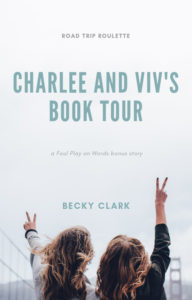
Subscribe TODAY and get your free short story!
June 6, 2020
An Adventure of Her Own
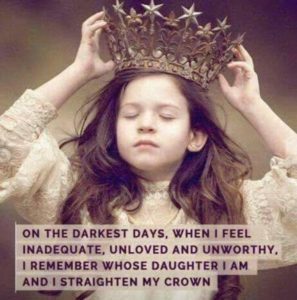
My mom, Eleanor, died Friday, June 5, 2020. I hope she’d say she lived a life full of adventure.
I’m the seventh of eight children. There were always enough of us to field a baseball team, or play a rollicking game of Tripoli and Michigan Rummy, or to stage a bike race, or to tell round-robin stories at dinnertime. But someone needed to corral us, feed us, clothe us, bathe us, and make sure we weren’t completely feral.
That someone was Mom.
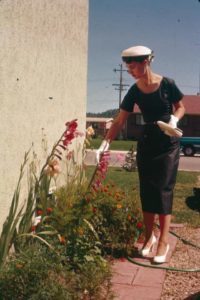
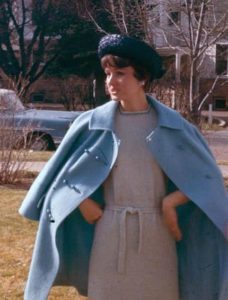
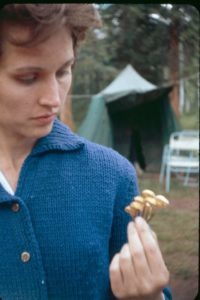
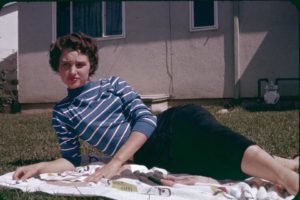
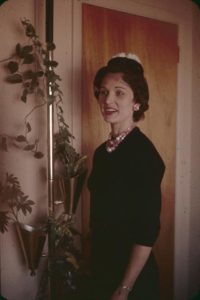
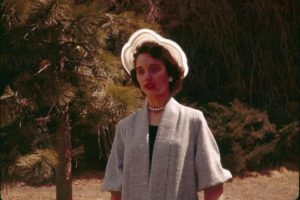
When they got married, Mom was 18 and Dad was 19. By the time she was 23, she had five kids. I was born when she was 30.
This math always floors me. I have three kids, my first when I was 26 and my last when I was 31. My husband and I joked that when we had our third, we had to go from man-to-man to zone defense. But what in the world did my parents have to do?
We were never wealthy, and some lean years were very lean indeed. But Mom always made a little bit seem like a lot, certainly more than enough, and always plenty. I learned that from her. I add a bit of water to a can of tomato sauce and swirl it to remove every bit. I sewed my own clothes. I run cold water when I turn on the disposal because when I was a kid, she taught me that was how it had to be done.
This last bit may be dubious information, however.
At the time I accepted her instruction with unquestioning gravity, but long after I was an adult I asked her why was it so important to use cold water with the disposal.
“Beats me,” she said. “Who told you that?”
“You did.”
“Hm. Wonder why.”
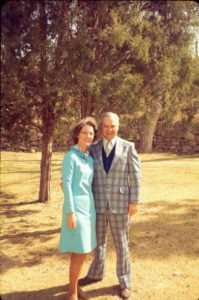
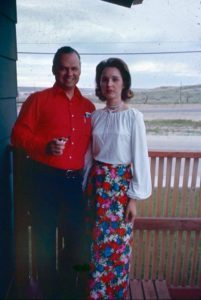
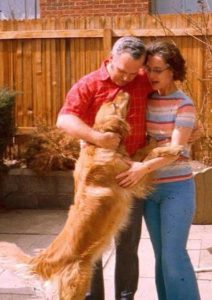
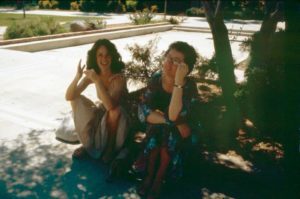
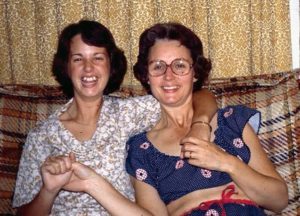
I was also a grown woman when I realized Mom must have had other hopes and dreams besides raising eight [perfectly remarkable and hardly feral] kids.
And by “realized,” I actually mean “got gobsmacked.”
I’ve blogged about this before, so indulge me if you’ve heard this story.
I got mad at my three children one day when they were youngish and terrible. I needed more than a time-out so I ran away. Only as far as the local library in our little Colorado town, but it was far enough. Far enough for me; too far for them.
I don’t think my kids were particularly scared, but they called my mother in California to tattle on me.
That evening, Mom called. When I told her the story of the behavioral chaos of my naughty children, expecting her to scold me, she laughed. “I’ve done the same thing,” she said. “Many times.”
I was immediately calmed and exonerated.
I shared that story on my blog ten or so years ago, adding this ….
I was reminded of this story today because I sat on the deck reading DEAR MRS LINDBERGH by Kathleen Hughes. It was a book I had given my mother as a gift several months earlier. She’s becoming more and more housebound caring for her declining husband. She has very few needs, so books, I’ve decided, are an excellent gift.
She lives in an apartment without much shelf space, though, so she carefully writes the name of the gift giver on a sticky note and returns the books when she’s finished. Often, she’ll include a note about how she enjoyed it—or didn’t.
Sometimes I give her books I’ve read that I know she’ll like. Other times I browse and find books I think she’ll like.
Such was the case with DEAR MRS LINDBERGH. I hadn’t read it, didn’t know anything about it. But I know Mom likes historical fiction, which this wasn’t, really, but it had that feel to it.
When I got to the end, I found a note from my mom tucked into it. In her precise cursive she told me she liked this one. She added, “On a very small scale I can relate to Ruth’s desire to fly away for an adventure of her own.”
Reading her note literally took my breath away.

My mother had eight children. I’m number seven. I was an adult before I ever knew—or thought to ask—if she had dreams for her life that didn’t involve a swarm of kids. She was a young teenager during World War II and the nurses captivated her imagination. But then she turned 18, got married, and immediately started having children. She and my dad never had any money. Nursing school was out of the question.
“On a very small scale I can relate to Ruth’s desire to fly away for an adventure of her own.”
I know Mom would say she’s had a perfectly fine life. But my heart has several tiny Mom-shaped cracks in it today.
I contrast my life with hers all the time. From the beginning, my husband and I had more money than she and my dad did. First, both of us had college degrees and we both had well-paying jobs upon graduation. We were able to buy a house in southern California before our first child was born. We had two cars and a washer and dryer, something my parents didn’t have for many, many years.
They’d cobbled together their American dream, gaining and losing ground periodically, but mostly making progress.
But when Mom was about fifty, her marriage to my dad suddenly crumbled. I didn’t appreciate how scary that must have been until I got to be about that age.
Here she was, fifty years old, only been in the labor pool for ten years or so in a handful of non-career-type jobs and boom—on her own. I was in college at the time and my younger sister was fifteen-ish. There was more than a little drama during that chaotic time, but because she was a practical woman, she rallied and soon enough took charge of herself again, with renewed determination.
It wasn’t long before she met someone and remarried, creating another long-term happy relationship.
And let me tell you, aside for its length and general happiness, this relationship was nothing like her previous one. First, this man was a tea-drinking, soccer-watching, Royal Air Force-pensioned British jazz musician, a far cry from my conservative insurance executive dad.
Second, they sold all their belongings, bought a big ‘ol RV, and traveled around the country attending jazz festivals.
Mom never became a nurse, or went to college. But in her 60s, she climbed into the driver’s seat of that monstrous vehicle and maneuvered it all over creation. She got on stage playing her fully-decked-out washboard in front of festival crowds, and found herself on the cover of the Wall Street Journal for it. She traveled to Europe.
She’d never have done any of that with my dad.

1994 Sacramento Jazz Festival
As I watched her dying in her hospital bed the other day, with her labored breathing and gaunt features, I wondered what she was thinking. Was she thinking about us? Was she praying? Was she remembering her life? I hope so. I hope she felt she’d finally had an adventure of her own.
When I had to leave, I kissed her on the forehead and thanked her for being a great mom. I also apologized for not being a great daughter. She roused herself from the morphine cloud and grinned at me. “You were fine. I love you.”
Later, relaying this to my husband, I laugh-cried because her subtext struck me funny. “Yeah, you were a perfectly adequate daughter. Not perfect, not terrible. Average. Solid C+. You could have applied yourself better, done more chores without being asked, visited more. And would it have killed you to bring me more wine?”
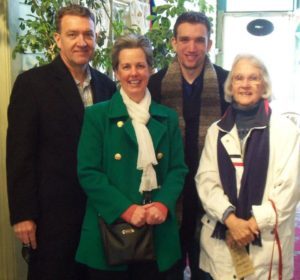
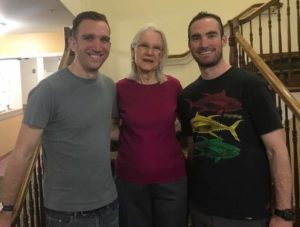
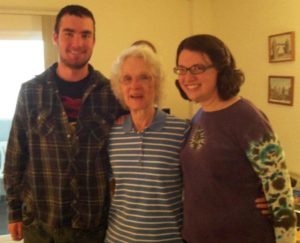
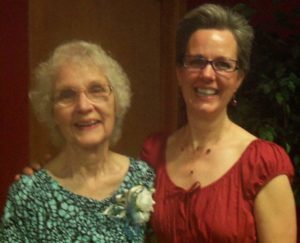
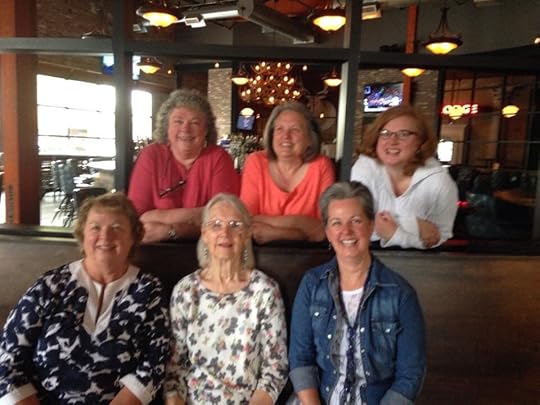
Mom with all her daughters
My sister Barbara wrote this in a letter to Mom recently and I thought it was so touching and exactly right.
“When I was a girl, my friend Leslie’s mother threw a birthday party every year for her, right before Christmas, and gave all the kids their own ornament with their name handwritten in glitter. I still have one and I hang it up every year on my tree. It reminds me of my childhood. I know someday it will break and every year when I get out the bins of decorations, I’m surprised to find it is still intact. But even if it were to dissolve into a million tiny pieces of green glittery dust, I’ll remember it, and my childhood.
And when you’re gone, and you’ve dissolved into a million glittery bits, I’ll remember you. When I put all the ingredients out on the counter before I mix up the recipe, when I do my chores before I go out to play, when I laugh helplessly over some nonsense, when I treat my children as equals, when I craft something beautiful or useful, when I notice lyrics that touch my heart, I’ll remember you.”
So, godspeed, Mom. Thanks for everything. I hope you enjoyed your eighty-eight year adventure.
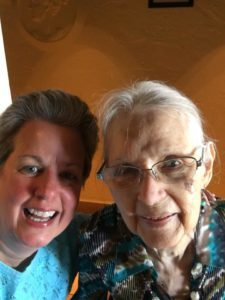
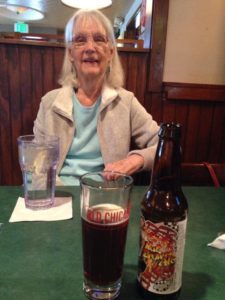
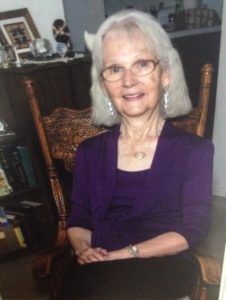

May 6, 2020
Protected: Come, Enter Into Becky’s Shearing Zone
This content is password protected. To view it please enter your password below:
Password:
April 27, 2020
I’ll See Your Hair, And Raise You A Book
I’ve had a couple of harmonic convergences in the last few months.
Last year I toyed with the idea of shaving my head. I’ve wanted to do it for quite a while—just for fun cuz I’ve never done it before—but the timing never quite worked out. There was always a family wedding (with photos!) or conference season (with photos!) getting in the way. Since I’d never done it before, I had no idea if it would be so ugly that I’d scare children and the elderly. So, timing was important to me.
Another thing getting in my way was the annual fundraising party I throw to raise money to fill backpacks with emergency necessities for foster kids suddenly removed from their homes. I’d been procrastinating setting a date because I had some events up in the air and the Backpack Party date requires finesse. I like to give people enough time to take advantage of back-to-school sales to buy clothes and backpacks, so I can’t do it too early in June or too late in August or when everyone is on vacation in July. Complicated!
Seemingly unrelated—but stick with me here—is that in February, an independent bookstore Books Are Awesome opened in my town, a glorious, glorious occasion as we haven’t had one here in twenty years. Finally, I’ll be able to send my readers to a dedicated indie store to buy signed copies of my books! I’ll have a local place for book launches! I’ll have a bookstore 1.38 miles from my house! O frabjous day!
(Books Are Awesome is abbreviated to BAA, so their logo is an adorable cartoon sheep. Definitely my kind of place!)
But then in March, the whole world shut down. No conferences. No Backpack Party. And potentially no bookstore.
Using the full force of my little grey cells, I tried to figure out how to help the foster kids and Books Are Awesome … and myself, if I’m being totes honest. It would break my heart to get a bookstore yanked from my little grubbies when it took so long to get one here.
One of the things we put in each backpack for the foster kids (along with new pjs, a couple of new outfits for school, a sweatshirt, toiletries, and a small stuffed animal) is a new book. But how could I get people to buy books specifically from Books Are Awesome for my foster kids project?
And then it came to me.
I’ll shave my head!
A shearing for BAA, if you will.
People would pay to see the aftermath of that, right? Then I could turn around and use the money to buy books for the backpacks from Books Are Awesome.
So that’s the plan, folks … if you want to see what Bald Becky looks like, all you have to do is donate to the Backpack Party GoFundMe page. In return, I’ll send you pics from all angles of my knobby head, perhaps even getting my stylist to create artistic and fun shapes as she goes shorter and shorter and …. gulp …. shorter. Maybe you’ll see something fabutastic like a Reverse Mohawk, or the rarely seen Three-Quarters Head of Hair.
Just like with the Wells Fargo wagon, it could be anything!
Any amount is welcome, but please be as generous as you can. Perhaps I’ll have a sliding scale … the bigger the donation, the more photos you’ll get of this potentially disastrous—and definitely ridiculous—event!
My appointment is tentatively set for Monday May 4th , which seems like it should be okay, but these days you can’t be too sure, eh? Regardless, the sooner you donate, the sooner you’ll see photos.
I promise not to be visible in public for at least a couple of months, which, at the rate my hair grows, might be enough to be back to normal. Rest assured, nobody will get to see my glorious noggin without paying.
So … who’s ready to help foster kids and a brand-spankin-new indie bookstore as well as have a hearty laugh at my expense??
March 6, 2020
I wrote a book about writing a book!
Very meta, eh?
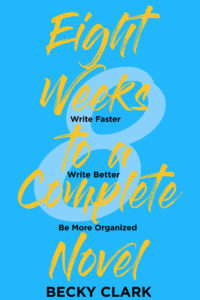
Want to speed up your writing process and complete a top-notch novel in just two months?
Learn veteran author Becky Clark’s tried-and-true techniques to:
Write faster
Organize yourself
Create a flexible outline you can live with (even if you hate outlines with an intensity usually reserved for walking into a spider web)
Devise your own reliable system to get you from the premise to THE END in eight short weeks.
Become the prolific career novelist you’ve always dreamed of!
I’ve already heard some encouraging things about it, and got the coveted orange #1 badge and some good rankings right out of the gate …
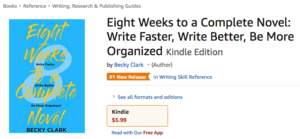
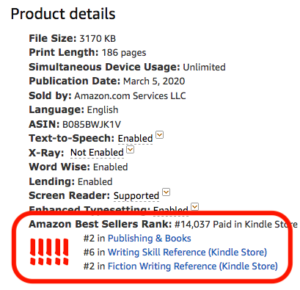
I know it won’t last, but it’ll be fun for a while!
Available in print and ebook on Amazon now … and other platforms soon!



